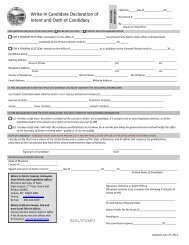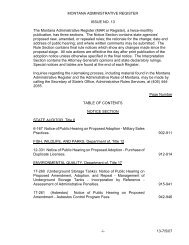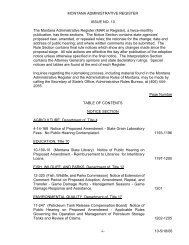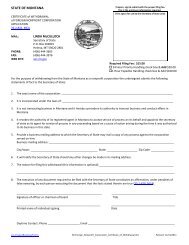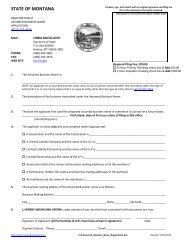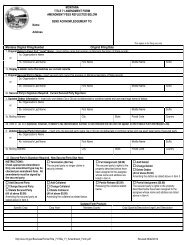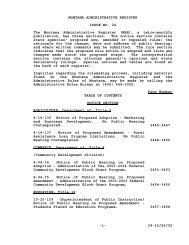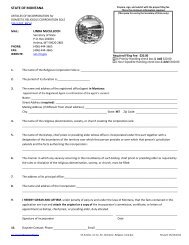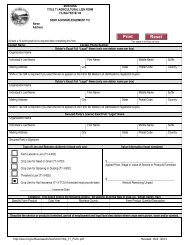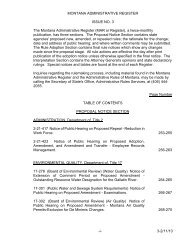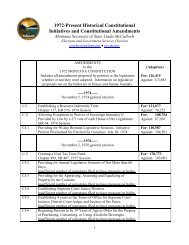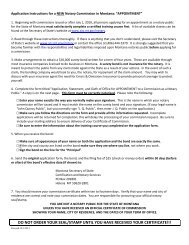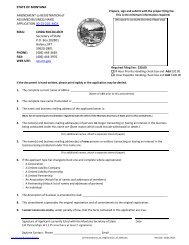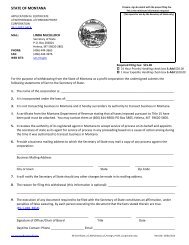Notary Handbook - the Montana Secretary of State Website
Notary Handbook - the Montana Secretary of State Website
Notary Handbook - the Montana Secretary of State Website
Create successful ePaper yourself
Turn your PDF publications into a flip-book with our unique Google optimized e-Paper software.
Steps to a proper notarization using a credible witness:<br />
1. Determine that <strong>the</strong> signer has a legitimate reason for not having any o<strong>the</strong>r means <strong>of</strong> ID.<br />
2. Place <strong>the</strong> credible witness under oath: “Do you swear under penalty <strong>of</strong> perjury that this is<br />
________________?”<br />
3. The credible witness signs <strong>the</strong> journal.<br />
4. The signer signs <strong>the</strong> document (if not already signed).<br />
5. The signer signs <strong>the</strong> journal.<br />
6. The notary completes <strong>the</strong> notarial block on <strong>the</strong> document.<br />
When a credible witness is used for identification <strong>of</strong> a document signer:<br />
• Personal knowledge is <strong>the</strong> only means <strong>of</strong> identification<br />
that can be used: NO IDs ALLOWED!<br />
• Three people are involved – <strong>the</strong> notary, <strong>the</strong> signer, and<br />
<strong>the</strong> credible witness.<br />
• All three people must be present when <strong>the</strong> notarization<br />
takes place.<br />
• Both <strong>the</strong> credible witness and <strong>the</strong> signer must sign <strong>the</strong><br />
notary’s journal.<br />
DETERMINING INTENT AND COMPREHENSION<br />
A notary’s duty is not limited to determining <strong>the</strong> identity <strong>of</strong> <strong>the</strong> signer, but also to determine that <strong>the</strong> signer<br />
understands <strong>the</strong> purpose <strong>of</strong> <strong>the</strong> document being signed and intends to sign <strong>the</strong> document. The standard that a<br />
notary is held to for <strong>the</strong>se determinations is one <strong>of</strong> “reasonable care”. The notary is not expected to be particularly<br />
knowledgeable about <strong>the</strong> ramifications or legal implications <strong>of</strong> a document; nei<strong>the</strong>r is <strong>the</strong> signer. As long as <strong>the</strong><br />
signer can communicate what <strong>the</strong> document is – a title, a power <strong>of</strong> attorney, a contract – with some measure <strong>of</strong><br />
understanding which <strong>the</strong> notary can confirm from a brief review <strong>of</strong> <strong>the</strong> document, <strong>the</strong> standard <strong>of</strong> reasonable care<br />
has been met.<br />
Generally speaking, intent can be inferred simply from <strong>the</strong> fact that <strong>the</strong> signer has requested that <strong>the</strong> notarization<br />
be performed. There are, however, situations where additional care must be taken by <strong>the</strong> notary; for example,<br />
when <strong>the</strong> signer appears to be under pressure or duress, or<br />
possibly being medicated or under <strong>the</strong> influence <strong>of</strong> alcohol or o<strong>the</strong>r<br />
substances.<br />
Failure to conclusively<br />
establish <strong>the</strong> identity,<br />
comprehension, and intent <strong>of</strong><br />
<strong>the</strong> person requesting a<br />
notarization to <strong>the</strong> degree <strong>of</strong><br />
reasonable care places <strong>the</strong><br />
notary at risk <strong>of</strong> being sued for<br />
negligence or malfeasance in<br />
<strong>of</strong>fice.<br />
In situations where <strong>the</strong>re is a question <strong>of</strong> pressure being put to<br />
bear on <strong>the</strong> signer, <strong>the</strong> notary should ask any o<strong>the</strong>rs in <strong>the</strong> room to<br />
leave and <strong>the</strong>n engage <strong>the</strong> signer in conversation about <strong>the</strong><br />
transaction. There is a difference between a person being<br />
unwilling or pressured to sign a document and being unhappy<br />
about <strong>the</strong> circumstances that have made it necessary for him or<br />
her to sign that document. When in doubt, <strong>the</strong> notary can get an<br />
opinion from an attorney or medical pr<strong>of</strong>essional familiar with <strong>the</strong><br />
signer.<br />
If <strong>the</strong>re is a question about <strong>the</strong> signer’s ability to understand <strong>the</strong><br />
document because <strong>of</strong> age, mental disease or disability, medication,<br />
or o<strong>the</strong>r factors, <strong>the</strong> notary may refuse to perform <strong>the</strong> notarization<br />
or suggest that it should be done at a later time as circumstances<br />
warrant.<br />
8



